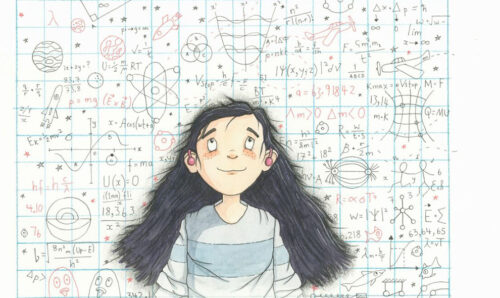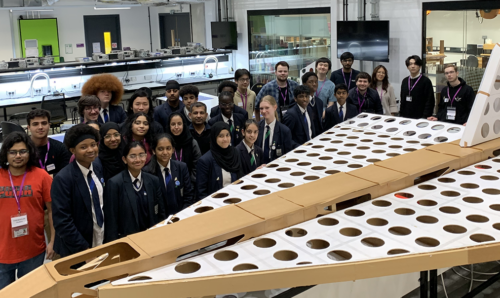Encouraging a love of learning and discovery in the European City of Science
Robotics and AI Social responsibility 22 August 2016
Few would dispute that the best time in life to discover and engage with science is during the formative early years. Just think how for many of our greatest innovators, something as simple as experimenting with magnets, water or even sticky tape as a child may have been the catalyst for a lifelong passion and an extraordinary scientific career!
 My name is Lynne Bianchi. I am the Director of The University of Manchester’s Science & Engineering Education Research and Innovation Hub (SEERIH) – a dynamic group which engages teachers and schoolchildren throughout Greater Manchester with a range of lively professional and curriculum development projects. You can learn more about its work (and Fascinate) at http://www.fascinate.manchester.ac.uk/.
My name is Lynne Bianchi. I am the Director of The University of Manchester’s Science & Engineering Education Research and Innovation Hub (SEERIH) – a dynamic group which engages teachers and schoolchildren throughout Greater Manchester with a range of lively professional and curriculum development projects. You can learn more about its work (and Fascinate) at http://www.fascinate.manchester.ac.uk/.
As a loyal Mancunian, I was delighted when our city was awarded European City of Science status. Many milestone scientific achievements have occurred here in Manchester – from the industrial revolution, to splitting the atom and creating the first programmable computer; not to mention more recently, the isolation of graphene. I am immensely proud of our city’s scientific heritage and feel this award is well deserved!
It is clear that I am not alone in this belief, as there have recently been a slew of exciting events, talks, exhibits and activities going on throughout the city, celebrating all things scientific. The five-day ESOF (EuroScience Open Forum 2016) brought all aspects of science to life through the Science in the City Programme in various locations throughout Manchester, such as the Robot Orchestra and Jodrell Bank’s inaugural Blue Dot Festival (dubbed ‘the Glastonbury of Science’) both successfully marrying science, technology and experimentation with arts, culture and live music. Needless to say, there has been plenty going on to stimulate scientific minds of all ages!
I myself have been involved with Manchester’s Great Science Share programme, with specific interest in primary teacher and school involvement. As part of the Great Primary Science Share, children from over 200 schools across Greater Manchester celebrated science in their schools and by coming together in Manchester Town Hall to showcase their learning and enthusiasm with new audiences and the wider community. Children ran exhibits, science fairs, demonstrated table-top investigations, busked, spoke with eminent scientists and much more. Key highlights included the creation of a bespoke performance with Dance Manchester called ‘Stellarium’ and the composition and performance of a brand new a Great Science Share anthem, supported by Hallé Education.
This is science at its best and how all our schools’ lessons ought to be – investigative, child-centred and related to the world beyond the classroom. Children should constantly be sculpting, questioning, scribbling, showing, reflecting, discovering! In short, their participation in the creation of the learning process should be where we start when designing learning opportunities. Many of our greatest scientific innovators share one common trait – curiosity and children have this in abundance. Sadly, it has increasingly been knocked out of our teachers due to wave after wave of education legislation and accountability measures. However, look around, and we see that the products we take for granted (our smartphones, tablets, microwaves, vehicles etc.) were all the result of scientific curiosity and ingenuity, and can be the stimulus for more going forward.
It seems that the Government’s Department of Education has encultured a perspective that Science is a less important ‘core’ subject to its sisters – English and Mathematics. Whilst I agree that a strong foundation in reading, writing and numeracy is crucial, I believe that our children also have an intrinsic desire and need to be given prized opportunities and time to create, innovate, investigate and experiment, and I feel this is something that is being overlooked in the Government’s education plans. Will our new Education Secretary change this?
I meet so many passionate educators who strive to deliver a broad, balanced curriculum to their pupils, yet they describe an intoxicating pressure resulting from accountability demands for the core subjects, particularly in literacy and numeracy. Doing justice to scientific subjects is no mean feat. What’s more, government policy is now pushing schools to dissociate creative subjects from the more ‘academic’ core subjects at secondary level. GCSE pupils will now be required to study English Baccalaureate subjects (i.e. English, Maths, one science, one humanity, and a modern foreign language). Many education professionals have voiced concerns that in order to meet the government’s new league table measures, students will have to limit the number of subjects they take.
I passionately believe that science is for everyone and in everyone – not just the preserve of a small elite. As educators, it is our collective responsibility to emphasise and illustrate how through creative, dynamic and artistic use of scientific knowledge, children can make the great scientific discoveries of tomorrow! We need to be relentless in our drive to create the opportunities that allow them to realise their full potential by making science accessible and relevant to each child and give them every encouragement and insight to allow them to pursue it in further education and their careers.
Having seen first-hand the inspiring work that can come from investing time and effort in our in-service teachers, I have every confidence that we can drive change through the work that SEERIH contributes. It won’t come by chance and it won’t always be easy, but without it we risk not being the catalyst for many more exciting scientific discoveries that can undoubtedly emerge from 2016’s European City of Science. I look forward to bringing you more on this in the near future and ask that if this is of keen interest to you too that you get in touch.
Dr Lynne Bianchi – Director of SEERIH
EngineeringEnvironmentOutreachScienceSocial responsibilityWomen in STEM




